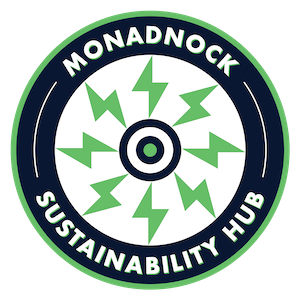By Catherine Owen Koning, Originally Published in The Monadnock Shopper News, Green Monadnock column, October 2024
Autumn has officially arrived after the hottest summer on record – more evidence of climate change. Many local groups are working hard to find solutions to the climate crisis. Some solutions are critical but complicated, including insulating your home, making it more energy efficient, and installing solar panels and heat pumps in your house or office building. If we can convince people to reduce their energy use and then power, heat, and cool their homes with electricity from solar, wind, hydro, or other clean energy, we can reduce our carbon emissions and avoid the worst impacts of climate change. The Monadnock Sustainability Hub has started a program to help people by identifying a coaching program where people who have been through the steps can help newcomers.
But what if you are a renter, a young person, or someone who just doesn’t have the money or the bandwidth to take these important steps to reduce the carbon emissions from heating, cooling, and powering your home?
At Franklin Pierce University, I work with many students who are keenly aware of climate change and are worried about it. But they aren’t in a position to control how their residence halls, rented apartments, or even their family homes are powered. What can they do?
We all have some amount of control over what we eat. So, our Climate Action Week, October 28th to November 1st, will focus on food and agriculture. Eating locally grown food helps solve many problems simultaneously. First, less carbon pollution is produced because the fruits, veggies, honey, cheese, etc., don’t have to be shipped from Mexico, Brazil, or other far-flung places. Second, you are keeping your dollars in the community, supporting your neighbors! Third, most of our local farms in New England are very careful to reduce their use of pesticides and other chemicals – it’s their own water that could be polluted. Fourth, the local farms around here tend to be smaller, so the animals that produce the chicken, beef, pork, cheese, or milk have a better life than the cows, chickens, and pigs living on giant factory farms elsewhere in the country.
Climate Action Week at Frankin Pierce will start with a “local food” event, making cider from locally grown apples and featuring a dairy cow from a farm in Fitzwilliam. We’ll all learn that cows, through no fault of their own, produce a lot of climate-warming methane, just by “chewing their cud.” Also, growing the food to feed the cows produces climate pollution and destroys tropical forests that would remove climate pollution from the air. Beef and lamb are worse than pork, which is worse than chicken; all of these produce way more climate pollution than tofu, nuts, or plant-based sources of protein. What we eat is even more important than where or how it was grown.
Production of beef and dairy products causes 15 to 20 percent of global warming. If every person reduced their meat and dairy consumption by half, that would save the equivalent of the carbon pollution from burning 1.8 trillion tons of coal. If Americans ate chicken instead of beef for one meal a day, we’d produce 50 percent less climate-warming pollution. If we ate plant-based protein instead of beef, we would achieve 75 percent of the reduction in carbon pollution needed to beat climate change!
Switching to plant-based food options is one of our most impactful actions. The Institute for Climate Action will work with our meal service provider, Sodexo, to feature plant-based protein options during Climate Action Week.
Students will also measure the food thrown away in the cafeteria because food waste in the US causes as much climate-warming pollution as 33 million cars each year. Anything thrown in the trash produces methane in landfills or carbon dioxide in incinerators, both of which are warming the planet. In addition, it took a lot of energy to grow, harvest, distribute, and cook the food that gets wasted. We hope to take action to reduce food waste on campus and in the local community, and we hope you will do the same. For more information, go to https://franklinpierce.edu/academics/colleges-centers/climate-action.html.
Catherine Owen Koning is a Professor of Environmental Science at Franklin Pierce University, where she co-coordinates the Institute for Climate Action. She is also a member of the Monadnock Sustainability Hub’s Board of Directors and co-
chairs the Keene Clean Energy Team.
